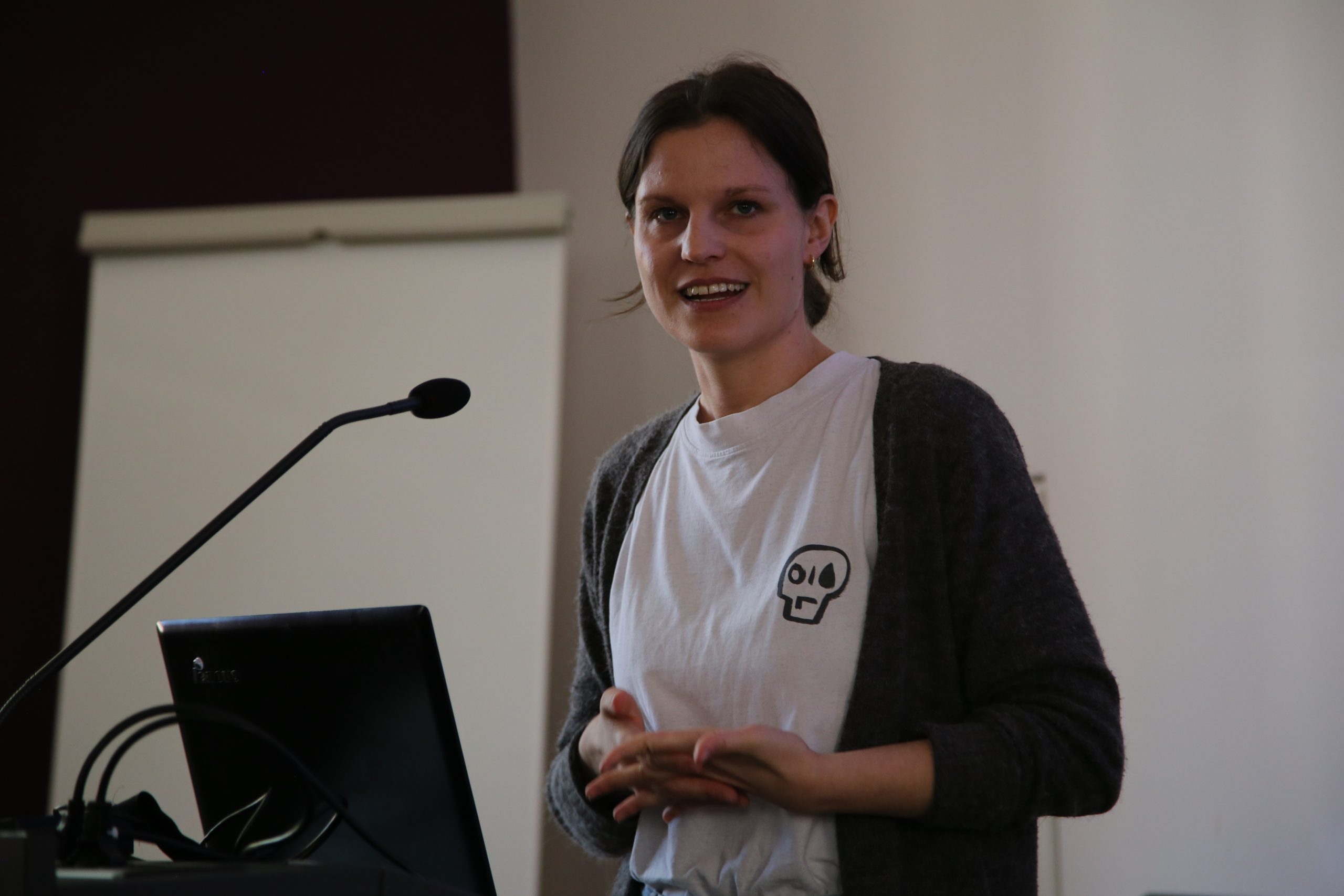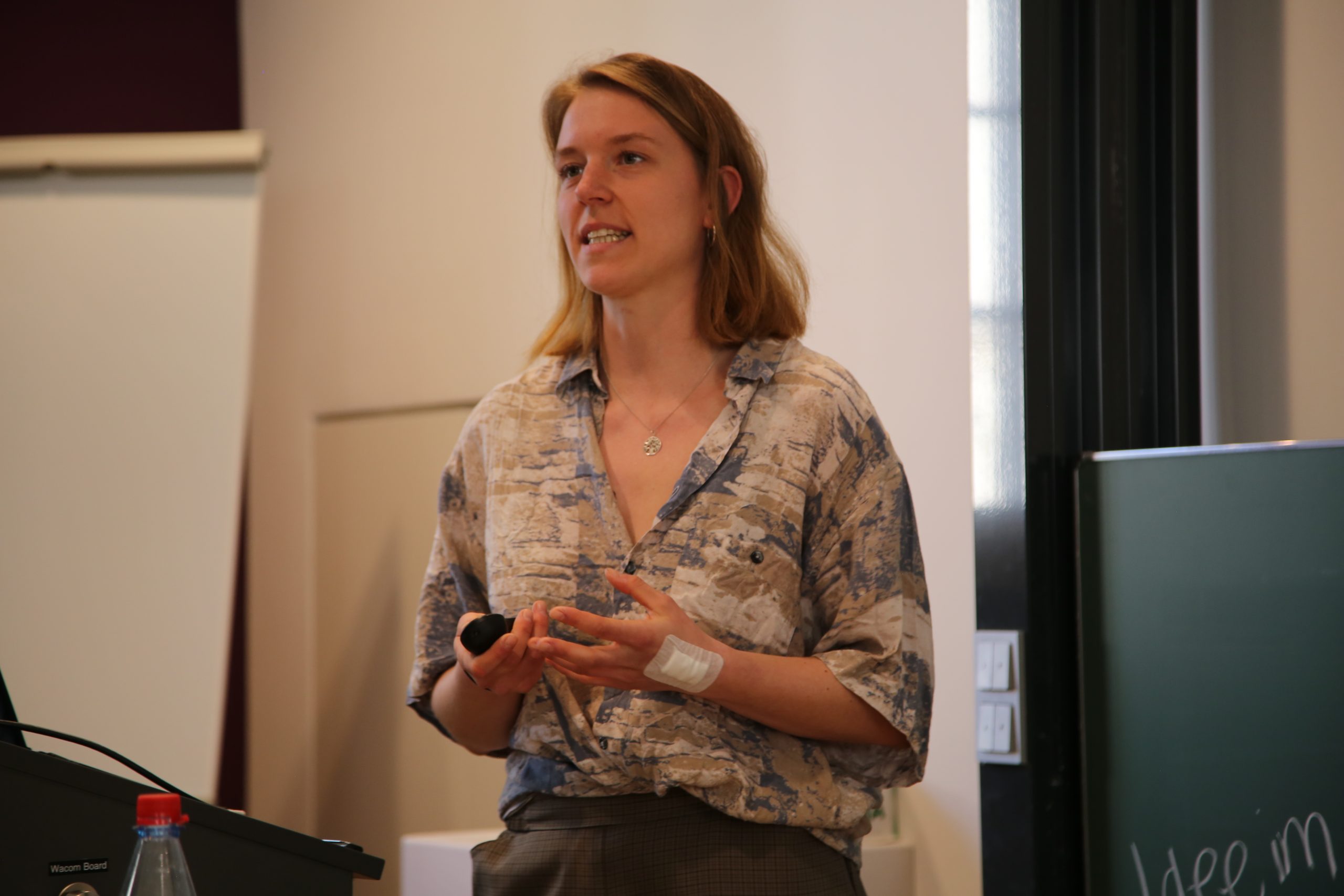From April 12 to 14, 2024, the FRIBIS activist conference titled Zukunft – Klima – Grundeinkommen (Future – Climate – Basic Income) took place in Freiburg. The aim of the conference was to bring together activists from the fields of climate protection and basic income to learn from each other, open up new perspectives, and create synergies. In the following report, you will find out how the conference went and what impressions and experiences the participants took with them.
Opening and Keynote Speeches
After the welcome by Bernhard Neumärker, FRIBIS director, Enno Schmidt, then managing director of FRIBIS, introduced the structure and character of the conference. Together with him, Helmo Pape (Generation Grundeinkommen Österreich) and Joy Ponader (Expedition Grundeinkommen) accompanied the conference organizationally and as moderators over the next three days. The conference then dove straight into the heart of the matter with keynote speeches by Jana Mestmäcker (Last Generation), Gregor Hagedorn (Scientists for Future), Simone Herpich (Scientists for Future), and Ronald Blaschke (Basic Income Network).
Gregor Hagedorn, academic director of the Museum of Natural History Berlin and co-founder of Scientists for Future, emphasized that scientists are always political – whether they speak out or remain silent. Ronald Blaschke, co-founder and spokesperson of the German Basic Income Network, pointed out that a basic income without an intact planet is not a viable solution, as ecological crises threaten the very foundation of our lives and economy. Jana Mestmäcker shared how she felt truly self-determined for the first time through her involvement with the Last Generation. Jana describes her motivation to participate in the conference as follows:

Jana Mestmäcker
I participated in the conference because I found the combination of the different circles – climate protest and basic income – intriguing. The atmosphere during the conference felt pleasant and intimate to me. The discussion circles encouraged exchange among participants. After conferences like this, I usually feel the urge to put what I’ve heard into action and bring disruptive protest to the streets to actively work towards political change – and this conference was no exception. I thought the basic income was a good idea before and I still see it that way. In my opinion, nothing would be more liberating for our society. Currently, actively participating in democracy too often remains a “hobby” of those who can afford it.
Discussion Circles and Networking
In the subsequent discussion circles, participants had the opportunity to delve deeper into the ideas sparked by the presentations and develop them further. A central topic was the exploration of the connections and commonalities between the climate and basic income movements. A key point of convergence identified was that both movements critically question the dominance of capitalism and the single-minded focus on paid employment. Instead of an economic system based on perpetual growth and consumerism, which often generates meaningless or harmful work, both the basic income and climate movements advocate for an economic order that aligns with the genuine needs of people and the requirements of the ecosystem.
Activism as a Way of Life
On Friday evening, Swiss Fridays for Future founder and youth delegate, Marie-Claire Graf, shared her journey as an activist and the motivation behind her social engagement. She spoke about the fears younger generations harbor about the future in the face of climate change and stressed the importance of viewing activism not merely as an activity, but as an integral part of one’s way of life.
Initiatives and Projects
Saturday began with a lecture by Herbert Jauch, who is committed to a basic income coalition and the training of activists in Namibia. Jauch recounted how the unconditional basic income pilot project in Otjivero, launched in 2008, initially yielded very positive outcomes, such as reduced poverty, improved health, increased school attendance, and a boost to the local economy. Despite these successes, the project was not continued or expanded after its conclusion. Instead, it faced fierce opposition from the Namibian government, churches, and international donors like the International Monetary Fund (IMF).
Following Herbert Jauch’s presentation, Rebecka Ambjörnsson introduced the KARUNA Family project, where young people can develop themselves in a voluntary year. Susanne Wiest and Uschi Bauer told the story of the “Coronation Wave” of 2012 – an initiative by their basic income movement where people were symbolically crowned as “true sovereigns” by donning paper crowns. The underlying idea was that a basic income would empower people to walk through life with dignity and self-determination.
Next, Christina Strohm and Dorothee Herzog from “My Basic Income” presented interim findings from their project. A preliminary report indicated that recipients of a basic income place greater value on climate-friendly behavior, suggesting that a basic income could positively influence ecologically sustainable conduct.
Ulrich Schachtschneider (Universal Basic Income Europe) presented reflections on an ecological basic income. He argued that approaches such as the climate money bonus already represent steps towards linking social security and ecological sustainability. Schachtschneider put forward the thesis that a basic income could contribute to reducing the demand for ecologically questionable consumer goods and services. As a result, a basic income reform could lead to a downsizing of the economic system in the long term and thus have positive effects on the environment.
Civil Disobedience and Resistance
On Saturday afternoon, the stage was taken by Lina Johnson (Last Generation), Kali* (Ende Gelände), and Werner Rätz (Attac BGE Network). Lina Johnson shared her personal activism journey and, referencing theorists like Erica Chenoweth and Gene Sharp as well as historical examples, highlighted the often underestimated power of peaceful civil resistance. Kali* presented a diverse array of video footage showcasing acts of civil disobedience against open-cast lignite mining. Werner Rätz’s subsequent lecture matched the passion and commitment of his younger fellow activists’ presentations. Lina Johnson’s reflection on the conference:

Lina Johnson
As a spokesperson for the Last Generation, I was invited to participate in the activist conference, which I was thrilled about. I experienced the conference as a multi-day, intensive, yet incredibly enjoyable space for exchanging knowledge and experiences, with concrete discussions on implementation possibilities. I especially appreciated the event’s personal touch and the diverse age groups that came together, mingled over delicious vegan snacks, and networked. I already considered unconditional basic income important and sensible before, but now I’ve been able to deepen my understanding of its connection to more effective climate protection and safeguarding vulnerable groups in times of escalating crises. I think the idea of combining direct actions of peaceful civil disobedience with the demands for an unconditional basic income is truly excellent, and I hope the movement will organize, connect, and experiment with this approach.
Last Day of the Conference
Sunday began with a summary of the personal impressions shared by all remaining participants. As a final activity, Rebecca Panian moderated the format “Voll auf die 12” (a German phrase meaning “to get hit hard” or “to be knocked for a loop”, used here to describe an intense, high-energy discussion format), in which 12 randomly selected “jurors” had to agree on a proposed solution within a limited time. Rebecca Panian had suggested this format to Enno Schmidt to generate concrete approaches for how the climate and basic income movements can collaborate. “I thought bringing together the climate and basic income movements was fantastic!” Rebecca Panian emphasized. She praised the conference’s structure, which offered not only informative presentations but also space for in-depth exchange and networking: “The structure of the conference was excellent because it wasn’t just one presentation after another. After about 4 input sessions, there was an opportunity to engage in deeper discussions with the person whose contribution resonated most with oneself.”
The event left a lasting impact on her, “because this merging of the two worlds – climate and basic income – was truly wonderful and important. Especially because a basic income would enable so many more people to get involved for the common good – and the planet!” Many valuable contacts emerged from the conference, and Rebecca is eager to see what else will develop from them. When asked if the conference changed her view on unconditional basic income, she replied: “No. It only confirmed that the idea is absolutely brilliant, and I want to do my best to make it a reality soon – as a human right.”
Conclusion
Throughout the conference, there was a pleasant and collegial atmosphere, enhanced by the delicious vegan catering provided by Sin Carne Schwarzwald GmbH. The event’s structure, with keynote speeches followed by discussion circles, allowed for both in-depth exploration of the topics and fostered exchange and networking among participants. The conference attracted an average of about 70 attendees, demonstrating significant public interest in the event.
Overall, the conference underscored the importance and value of an interdisciplinary and trans-activist dialogue between the climate protection and basic income movements. Many participants left with new insights, contacts, and impulses for concrete action. It remains exciting to see what further developments and initiatives will emerge from the connections formed during the conference.




































